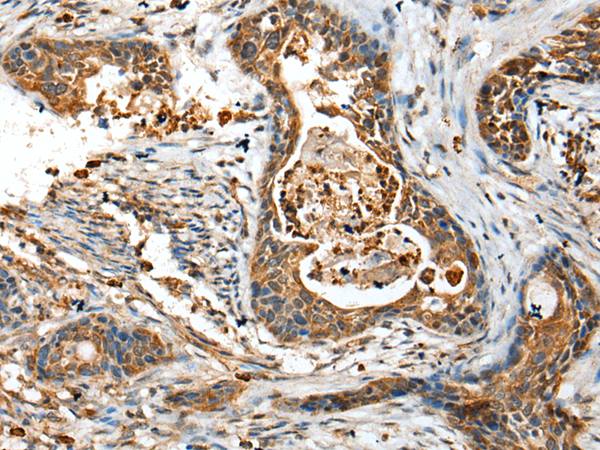IFITM1 Rabbit Polyclonal Antibody
Other products for "IFITM1"
Specifications
| Product Data | |
| Applications | IHC |
| Recommended Dilution | IHC: 25-100 Positive control: Human cervical cancer Predicted cell location: Cytoplasm and Cell membrane |
| Reactivities | Human, Mouse |
| Host | Rabbit |
| Isotype | IgG |
| Clonality | Polyclonal |
| Immunogen | Synthetic peptide of human IFITM1 |
| Formulation | pH7.4 PBS, 0.05% NaN3, 40% Glycerol |
| Concentration | lot specific |
| Purification | Antigen affinity purification |
| Conjugation | Unconjugated |
| Storage | Store at -20°C. |
| Stability | 1 year |
| Database Link | |
| Background | Interferons (IFNs) are potential antitumor agents, as they exhibit antiproliferative and differentiating properties, in addition to functioning in the defense against microbial infections. IFN exposure induces the regulation of expression levels of cellular proteins that mediate the pleiotropic effects of interferons. These effects may be mediated by soluble factors or by cell-cell interactions involving specific membrane proteins. The IFITM family of proteins are transmembrane proteins so named because their expression is IFN-inducible. IFITM proteins have been found upregulated in human colorectal carcinomas. Both mouse IFITM1 (also known as CD225) and IFITM3 demonstrate expression on the cell surfaces of primordial germ cells in a developmentally-regulated manner. They presumably modulate cell adhesion and influence cell differentiation. IFITM1 activity is required for primordial germ cell transit, and IFITM1 acts as a repulsive molecule by repelling non-IFITM1-expressing primordial germ cells from the mesoderm into the endoderm. |
| Reference Data | |
Documents
| Product Manuals |
| FAQs |
| SDS |
{0} Product Review(s)
0 Product Review(s)
Submit review
Be the first one to submit a review
Product Citations
*Delivery time may vary from web posted schedule. Occasional delays may occur due to unforeseen
complexities in the preparation of your product. International customers may expect an additional 1-2 weeks
in shipping.






























































































































































































































































 Germany
Germany
 Japan
Japan
 United Kingdom
United Kingdom
 China
China






